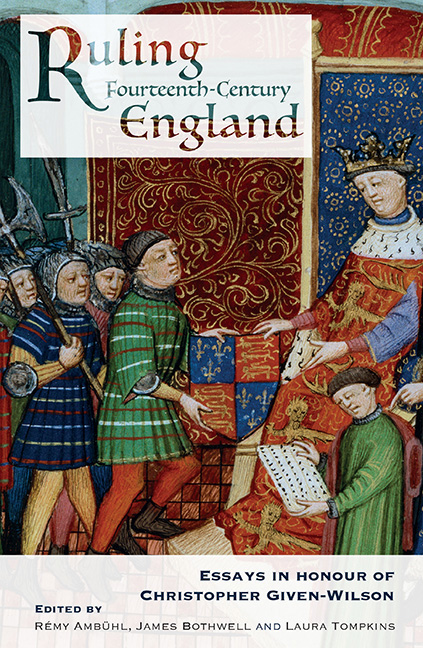Book contents
- Frontmatter
- Contents
- Contributors
- Abbreviations
- Introduction
- The Efficiency of English Royal Administration in the Last Years of Edward I
- Government and Market in the Early Fourteenth Century
- Kings' Clerks: The Essential Tools of Government
- Edward II: Favourites, Loyalty and Kingship
- The Perils of Lordship: The Life and Death of William Tuchet (c. 1275–1322)
- ‘War’, ‘Rebellion’ or ‘Perilous Times’? Political Taxonomy and the Conflict in England, 1321–2
- The Carlisle Roll of Arms and the Political Fabric of Military Service under Edward III
- What's in a Title? Comital Development, Political Pressures and Questions of Purpose in Fourteenth-Century England
- Edward the Black Prince: Lordship and Administration in the Plantagenet Empire
- ‘Said the Mistress to the Bishop’: Alice Perrers, William Wykeham and Court Networks in Fourteenth-Century England
- The Politics of Surrender: Treason, Trials and Recrimination in the 1370s
- Richard II in the Mirror of Christendom
- Bibliography
- Index
- Tabula Gratulatoria
Edward the Black Prince: Lordship and Administration in the Plantagenet Empire
Published online by Cambridge University Press: 18 September 2019
- Frontmatter
- Contents
- Contributors
- Abbreviations
- Introduction
- The Efficiency of English Royal Administration in the Last Years of Edward I
- Government and Market in the Early Fourteenth Century
- Kings' Clerks: The Essential Tools of Government
- Edward II: Favourites, Loyalty and Kingship
- The Perils of Lordship: The Life and Death of William Tuchet (c. 1275–1322)
- ‘War’, ‘Rebellion’ or ‘Perilous Times’? Political Taxonomy and the Conflict in England, 1321–2
- The Carlisle Roll of Arms and the Political Fabric of Military Service under Edward III
- What's in a Title? Comital Development, Political Pressures and Questions of Purpose in Fourteenth-Century England
- Edward the Black Prince: Lordship and Administration in the Plantagenet Empire
- ‘Said the Mistress to the Bishop’: Alice Perrers, William Wykeham and Court Networks in Fourteenth-Century England
- The Politics of Surrender: Treason, Trials and Recrimination in the 1370s
- Richard II in the Mirror of Christendom
- Bibliography
- Index
- Tabula Gratulatoria
Summary
A consideration of the lordship of Edward the Black Prince (1330–76) addresses themes and issues that have been central to much of Chris Given-Wilson's work. His analyses of the nature of Plantagenet power at home and abroad, the structure and ethos of the late medieval English nobility and the administration of and personnel involved in the management of aristocratic estates illuminate either directly or through comparison a wide variety of matters pertaining to the Black Prince's demesne. It is important from the outset to recognise the remarkable and, for a time, unique character of this assemblage of territories. Chester, Cornwall, Wales and Gascony (later extended to become the principality of Aquitaine) together comprised an unusually diverse and challenging political space. This paper offers some thoughts on the place of the Black Prince's lordship within the wider context of Plantagenet ambitions in the long fourteenth century and also reflects on matters of administration within his estates which replicated English approaches to governance, especially in the post-plague years. It asks whether we can see his administration as an example of the centralising tendencies of the Plantagenet ‘state’ imposed on areas where they proved profoundly unsuitable.
Devolved authority in the Plantagenet Empire
The prince lived during a period of enormous political turmoil and his career is indicative of the changing impulses that drove Plantagenet policy through the middle years of the fourteenth century. The eruption of the Hundred Years War just before his seventh birthday may be seen as the most significant development of his life. Edward played a crucial role in the initial phase of the Anglo-French struggle not only in his capacity as heir-apparent but also alongside and in some ways as one of the ‘new nobility’ Edward III (r.1327–77) elevated to political prominence in 1337. In the years that followed, the campaign for France refashioned and, in some ways, restored conceptions of Plantagenet lordship to an earlier pattern, returning the monarchy's geopolitical objectives to a focus across the Channel and away from those ‘British’ concerns that had been of increasing importance during and since Edward I's reign (1272–1307).
- Type
- Chapter
- Information
- Ruling Fourteenth-Century EnglandEssays in Honour of Christopher Given-Wilson, pp. 185 - 204Publisher: Boydell & BrewerPrint publication year: 2019



